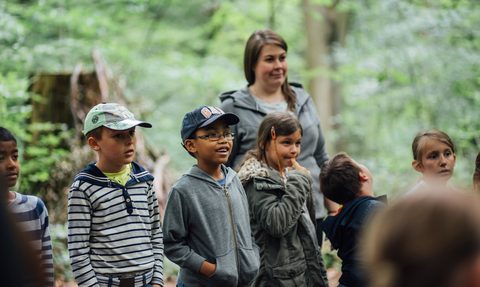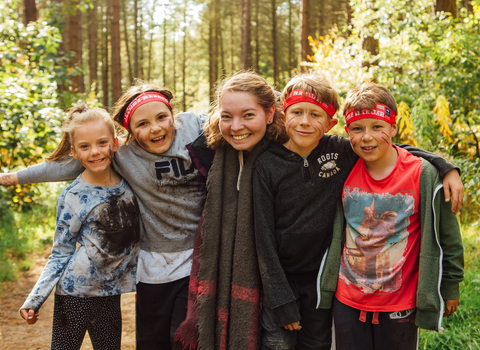
Helena Dolby for Sheffield & Rotherham Wildlife Trust
Watch groups
Getting involved
Across the UK hundreds of adult volunteers are dedicated to running Wildlife Watch groups. These are groups where children can meet and enjoy exploring their environment. Going regularly to a group enables young people to have lots of fun and make new friends, whilst they develop a real connection to the natural environment.
Watch groups give children opportunities to discover local wildlife and get stuck into practical activities. The activities can include anything from environmental artwork to barn owl surveys to pond dipping!
All groups operate within a monitored framework of child welfare and safety. All Watch leaders undergo a thorough recruitment process to check their suitability to work with young people.
Questions and answers
How often do Wildlife Watch groups meet?
This varies from group to group. On average there are meetings once a month, although there is so much going on in some areas that groups may meet more frequently.
Are groups open to children of all ages?
Many are, but an increasing number cater for the younger age group (up to 12) and may offer something slightly different (instead of or as well as) for teenagers. Some groups comprise just 12 plus with the young people shaping their own projects and activities with just a little leader support and guidance, whilst older teenagers may stay with a younger group as helpers. Check locally to find out what is available.
Please note that Watch is generally advertised as a club for children of eight years and above, and although there are many younger children who do join in, and are usually encouraged to do so, the leader is not obliged to accept any child.
In England, The Children Act of 1989 requires that a group with unaccompanied children under the age of eight has to register as a child-minding service if a specified number of their meetings are scheduled to last longer than two hours. Watch groups are not generally registered as such, so, on longer meetings or outings, you would need to accompany younger children. Your local Wildlife Trust will be able to tell you more about this.
Who are the group leaders?
People like you, from all kinds of backgrounds! Anyone who enjoys working with children and has an interest in the natural world can apply to become a Watch leader.
Registered Watch leaders work within our UK-wide framework of guidelines, but each brings their own style, ideas and enthusiasm for wildlife and the environment. In the interests of the children, potential leaders are vetted in accordance with government guidelines and our own policy on safeguarding children. As part of the leader recruitment process a satisfactory Enhanced level Disclosure from the Criminal Records Bureau is required.
Once they join the team, leaders receive support material and services from the Wildlife Watch UK office. Local training and support from their county Watch organiser helps leaders plan and organise their groups effectively.
Will I need to pay more for my child to go to a group?
As a member, the donation you pay goes towards the cost of running Watch and providing the membership package.
Watch groups do not automatically receive any financial assistance and sometimes ask a small fee for meetings. This is to cover costs of, for example, hiring the hall, buying simple equipment or producing duplicated material. Check locally to find out how your group works.
Can adults attend?
Sometimes group leaders encourage parents to stay, particularly if there are a lot of younger children. If this happens, please do not expect the activity to be pitched at your level as it will be aimed at the children.
Conversely, sometimes the group may not want you there all the time! The experiences children share in peer groups away from their parents are different from those you will have as a family. Please respect the wishes of the group as far as you can.
Can I be sure the activities will be safe?
Many activities are held close to a regular base or even indoors, and you should know the type of activity planned from the programme. If the meeting includes going further away (perhaps a visit to a nature reserve), the leaders will give you information in advance. Watch leaders adhere to comprehensive guidelines relating to responsible and appropriate planning. They also have public liability insurance. Our attitude is one of 'can do' and of looking very hard at the benefits from all the different activities in balance with any hazards we need to manage.
Is my child insured against accidents on Watch meetings?
No. There is no accident insurance for children at Watch groups. Unless your child is insured through a family policy in their day to day lives, they will not be insured at Watch group. Leaders have public liability insurance in the event of being found responsible for any incident.

